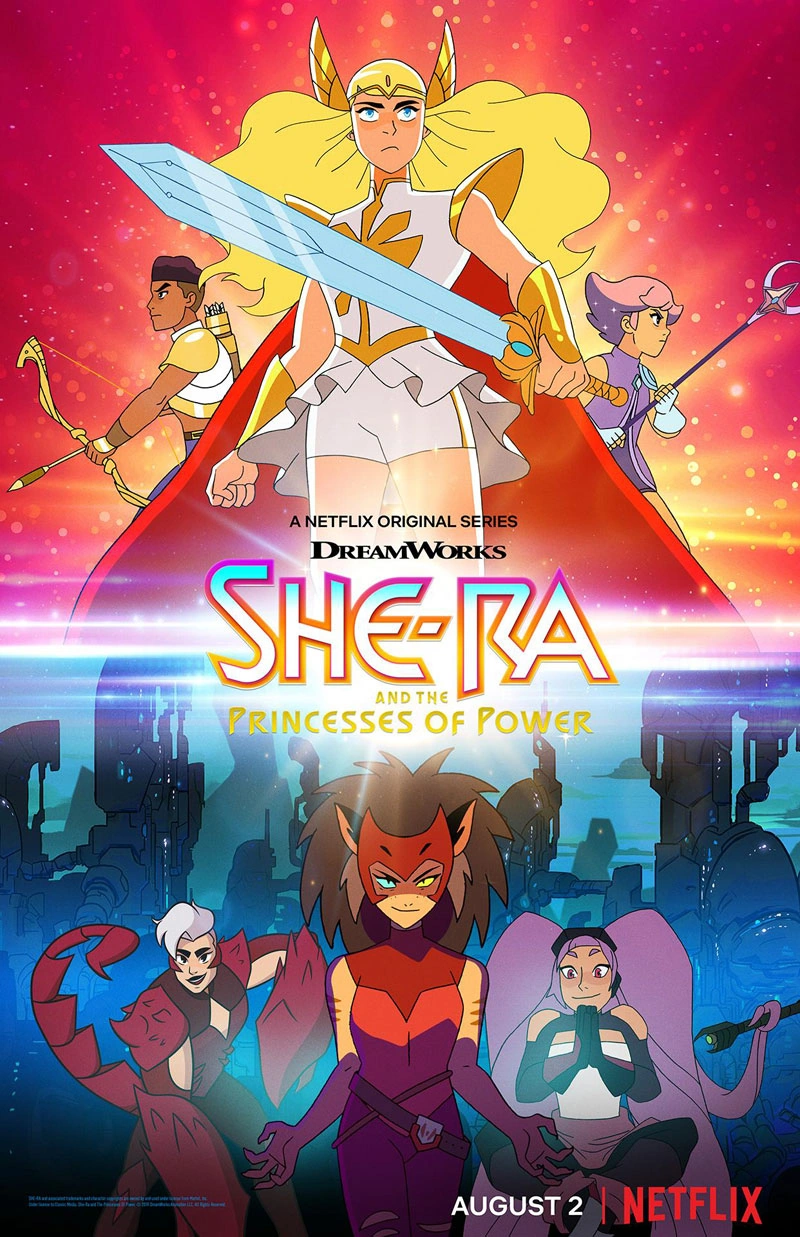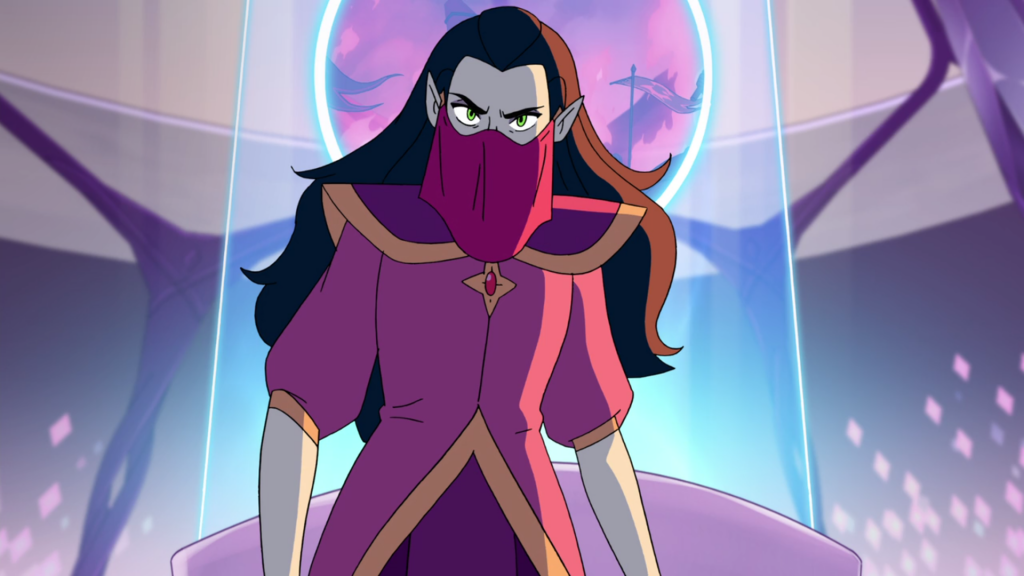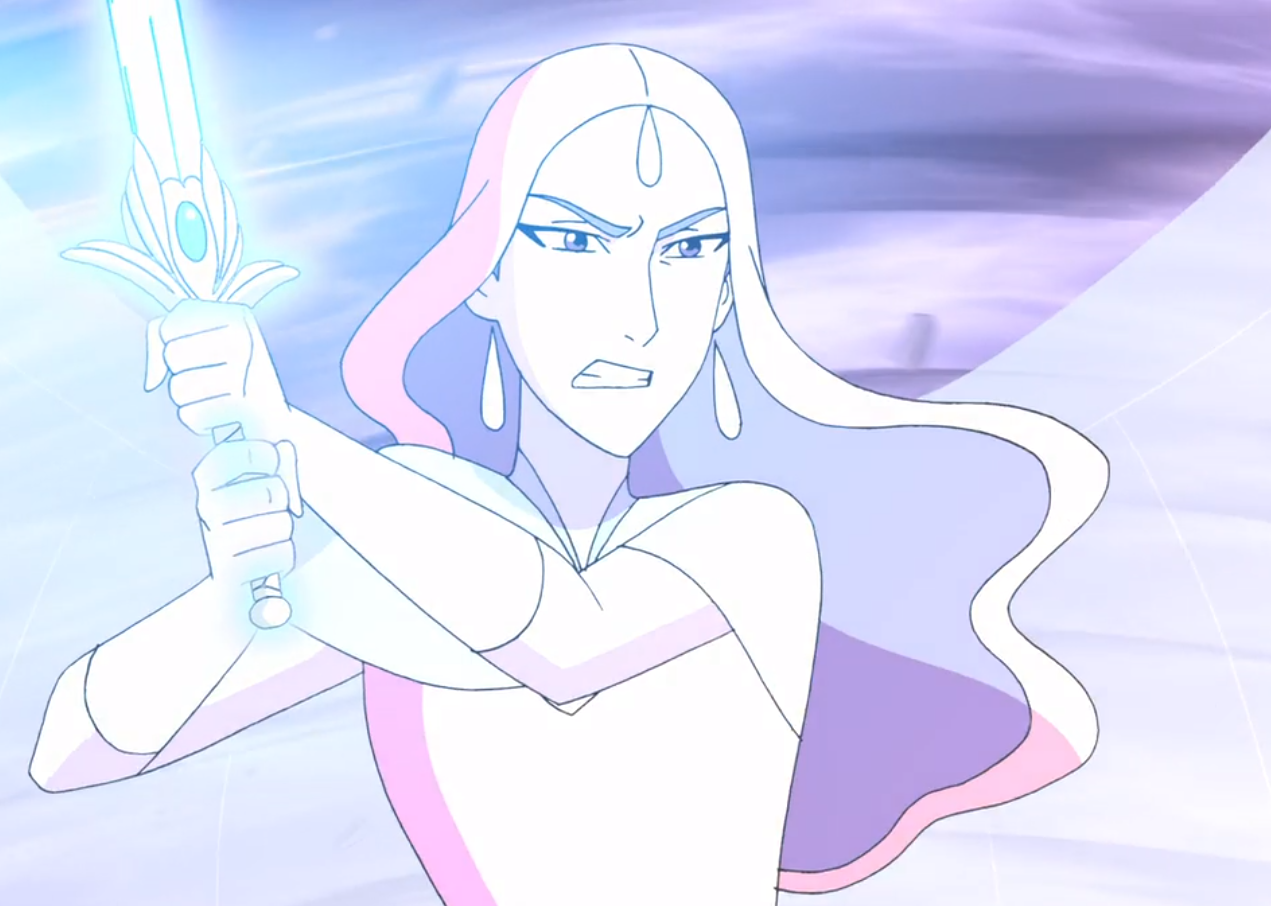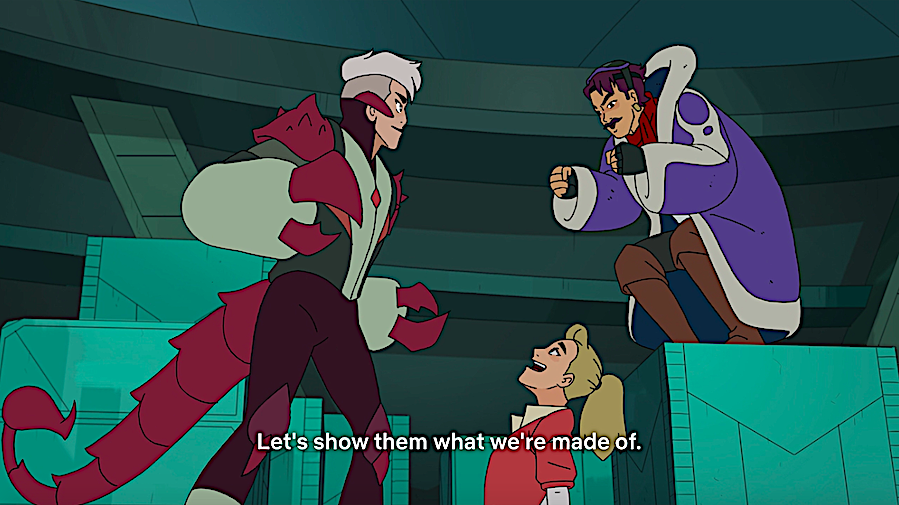Netflix's "She-Ra and the Princesses of Power" Retrospective: Seasons Two & Three
 |
| image courtesy of Fandom.com |
Welcome to Part 2 of our three-part She-Ra retrospective! Today we're looking at Seasons Two and Three (because according to the show's creator, Noelle Stevenson, they were written as one complete season). With the Princess Alliance united and Catra taking her place as Hordak's second-in-command (but still feeling pushed aside thanks to Entrapta and Hordak's budding relationship), these episodes take a deep dive into the themes and narratives introduced in Season One. Adora's continued path to finding her place and purpose. Catra's perpetual state of being caught up in cycles of abuse and perpetuating them. Power dynamics and fear of failure and so much more. But perhaps my favorite aspect of these episodes is their exploration of science through the character of Entrapta...
 |
| image courtesy of Know Your Meme |
Bow: "Entrapta, are you on the Horde's side now?"
Entrapta: "I'm on the side of SCIENCE!"
That really says it all, in a way, doesn't it? Entrapta is one of my favorite characters in She-Ra for this exact reason: she is a clear-cut representation of unchecked scientific/technological discovery with no ethical constraints. She will do anything--including joining the Horde--to further her scientific research, some of which turns out to be very risky or even dangerous. (And beyond that, there's even a moment in Season 2, Episode 3, "Signals," where Bow invokes Entrapta as a symbol of something even greater: "Magic and tech aren't totally separate things," Bow says. "Entrapta is one of the few people that truly understands that. She got closer to combining them than anyone else." I can't even describe how much I love this idea that magic and tech--or by proxy, science and religion, perhaps--are more interconnected than most people realize; that is my exact brand of strawberry jam. But I digress.)
Of course, Entrapta, like so many on the science side of the sometimes-tense relationship between science and ethics, brushes this off with some of the more typical platitudes--all scientific discovery has an element of risk involved, that sort of thing--but eventually even she comes around and realizes the error of her ways as she does the calculations and realizes that the portal she and Hordak have been building is likely to collapse space and time if it's opened. Even Hordak eventually seems to grasp the danger of opening the portal which is perhaps as much a testament to the relationship between Entrapta and Hordak as anything.
 |
| image courtesy of Fandom.com |
The Entrapta/Hordak relationship is a significant arc in these episodes and provides ample opportunity to explore a couple of other major themes. While the humanization and sympathetic portrayal of Hordak could be seen as risky or even problematic by some, I totally disagree. I love that they gave Hordak a tragic backstory, that they had the courage to portray even the biggest bad of them all as a child of tragedy and trauma. Not only that, but the fact that it's revealed that he's actually a "defective" clone and that's why he has to wear the suit to survive kinda technically makes him the only visibly physically disabled person in the series (as far as I remember). The only reason he's not thought of in those terms, I think, is because he actually lives in a universe that fully accommodates his disability!
But that's not all. Through the Entrapta/Hordak relationship, we get so many great moments and reflections. When they first start working together, Entrapta remarks that she's "never had a lab partner before" which is such a heartbreaking illustration of how lonely both of these people must have been before finding some connection with each other. Hordak even seems to begin to learn how to actually feel feelings, even being shown with tears in his eyes at one point. But for me, the most interesting thing they do with Hordak and Entrapta is exploring fear of failure. Hordak, perhaps owing to his origin as a "defective" clone, has a big problem with failure and imperfection. (In fact, I wonder if this has something to do with his bigotry toward people whose ignorance is no fault of their own, castigating Etheria as a backwater planet full of inferior inhabitants who are apparently the only people he's ever met who don't realize there's a whole universe filled with stars and planets--not all that dissimilar, in its own way, from the way many upper class liberals talk about people from the South and the "poorly educated.") Entrapta, however, helps him understand that "failure is a vital part of all scientific endeavor." It's easy to see why he likes her. :)
 |
| image courtesy of Reddit |
Perhaps the greatest achievement with the Hordak character is his place in the exploration of a very big overarching question in the series: can "evil" people change? Take this (abridged) exchange between Bow and Adora:
Bow: "Evil people don't change."
Adora: "I'm from the Horde. I changed."
Bow: "That's different. You're not like them...."
Adora: "I was just like them...."
This question means so much for our world. Not just in the conversations among lovers of stories about which characters are worthy of redemption but in the conversations about who is worthy of redemption in real life and what that looks like. To me, the idea that there are certain people, in life or in fiction, who are irredeemable is very dangerous. "Evil" (for lack of a better, less...old testament word for hate, destruction, oppression, and violence) thrives in the absence of love and compassion. Moreover, so much of what we call "evil" has actually been largely created by these conditions--and that's the power of redemption in fiction: it gives the audience an honest, compassionate perspective on people who would otherwise be perceived from the outside as monsters, pulling back the layers to reveal the abuse and trauma that often has such a huge hand in making monsters of otherwise decent people.
This is why "cycles of abuse" are a thing. Growing up abused not only deeply damages a person but it conditions their psyche to normalize and act out the abuse they experience, perpetuating the cycle. This is what Catra has been going through her whole life. No character in the series exemplifies getting caught up in cycles of abuse more than Catra--viciously abused by both Hordak and Shadow Weaver (both abuse victims themselves) she acts out that abuse not just on Adora and the Rebellion but eventually on her own soldiers in her command. Her brain and her heart become so bruised and broken that she ultimately convinces herself that the only way she can be happy is by "beating" Adora to prove to herself, to Adora, to Shadow Weaver, to Hordak, and everyone that she is better than Adora and therefore worthy of love and respect. She becomes so obsessed with "winning" that in spite of pretty much everyone else thinking it's a bad idea, she chooses to open the portal at the end of Season Three...literally just because Adora told her not to.
/cdn.vox-cdn.com/uploads/chorus_image/image/62622775/Screen_Shot_2018_12_03_at_3.36.23_PM.0.png) |
| image courtesy of Polygon.com |
This is the other side of the coin that is redemption in fiction that so many people seem to miss--the core of redemption is choice. Redemption isn't easy. You don't get to just decide you want to be redeemed, you have to earn it by making difficult choices. You have to earn it by being accountable and atoning for the things you've done, by choosing to make things right by doing the right thing. In a country where our "justice" system is almost exclusively punitive, we have very little frame of reference as a society for discussing the possibility of justice as a restorative process. We saw this particular phenomenon around the death of Kobe Bryant as so many gave voice to the pain of survivors watching people celebrate rapists and some responded by positing a question as to whether people felt justice hadn't been done because Kobe never went to jail despite the fact that he had taken some pretty significant steps to repair the harm he did. That is literally the difference between punitive justice and restorative justice and we as a society are desperately in need of more stories that give us visions of restorative justice to aspire to.
Choice isn't just at the core of the potential redemption arcs of She-Ra either. Every character faces difficult and important choices that are central to their character arcs in these episodes. In one of my favorite episodes, Season 2, Episode 7, "Reunion," we get to meet BOW'S TWO DADS who are absolutely precious and delightful--but we also learn that Bow has chosen to lie to them about who he is to protect them. In a scene that must have sounded all-too-familiar to many queer and trans fans of the show (some of whom, it must be said, don't even have the choices Bow and others may have) and so many others as well, Bow confides in Glimmer:
Bow: "I act like someone I'm not with my family because the truth would hurt them."
Glimmer: "And it's making you miserable. Bow, your dads love you. I'm sure they'll love the real you, too."
Bow: "You don't know that. They've had a plan for me since I was a baby. But the truth is, I'm nothing like the rest of my family. I've tried to tell them before but they don't want to hear it. So, I pretend."
Interestingly enough, Bow ultimately is not given much of a choice in revealing the truth to his parents--perhaps he could have continued to weave an even more intricate web of lies to protect them but finally he does have the difficult conversation and finds them to be completely accepting of who he is because they just want him to be happy. You love to see it.
 |
| image courtesy of World Geekly News |
In Season 2, Episode 6, "Light Spinner," we see choice at play yet again. In the early days of the Horde and the original Princess Alliance, Mystacor and Etheria are threatened and Light Spinner (Shadow Weaver in her previous life) believes that they can't rely on the ineffectual princesses to handle the threat. She, along with her star pupil, a young Micah, choose to try the Spell of Obtainment, which allows a sorcerer to "take power" for themselves. This is a dangerous and dark spell, forbidden by the Guild, and when Light Spinner presents the idea to them and they refuse, she takes it upon herself and Micah to perform the spell because, in their view, it's the only way to protect Etheria. Ultimately the spell proves every bit as dangerous as the Guild claims as it imbues Light Spinner with the power to leech magic from people by literally devouring them whole, in a beautifully evocative metaphor for the dangers of taking power by force. But eventually we do also see Shadow Weaver choose to leave the Horde and "join" (sort of? maybe?) the Rebellion to try stop Hordak from opening the portal. (Though, interestingly, she also appears to be continuing to use the Spell of Obtainment to let her and Glimmer use each other's power in doing so.)
We see the theme of choice yet again with Angella's character arc. So much of the series she spends at odds with Glimmer as she tries to protect her from harm in spite of Glimmer wanting desperate to go out and fight for the Rebellion. In Season One we find out that it's because she ordered the battle that King Micah was killed in--and not only that but she chose to stop fighting to save the original Princess Alliance when times got tough. She tells Glimmer to not make the same mistakes she made and eventually gives her Micah's staff, lamenting that she wanted so much to make Glimmer more like her but in reality, she's much more like King Micah. This is the heart of Angella's arc, as she beautifully explains as it reaches its climax inside the portal at the end of Season Three: "Do you want to know a secret?" she muses to Adora. "I am a coward....I've always been the queen that stayed behind....I told myself I was being responsible but I was just scared. And then I met you. You inspired us. You inspired me. Not because it was your destiny but because you never let fear stop you. And now, I choose to be brave." And she removes the sword from the portal, trapping herself inside to save Adora from the same fate.
 |
| image courtesy of evisamora.tumblr.com |
Choice, more so than any other character in the series, is at the very heart of Adora's arc--choice and destiny. So much of Season One was establishing Adora as a character who was desperately seeking a place and purpose in the world and this ultimately becomes tied up in her destiny as chosen one: She-Ra is her destiny. But throughout Seasons Two and Three, there is a palpable tension between what Light Hope tells her is her destiny and her ability to choose her own destiny. She struggles even more with her destiny as She-Ra as more and more is revealed of Mara's time as She-Ra. In Season One, Light Hope tells Adora that Mara was "compromised" and "acting erratically" but the more Adora learns about Mara, the more she questions that narrative. And in one of the most evocative scenes of the series, Adora finally demands of Light Hope: "Don't I get a say in what happens to me? Don't I get a choice?" Light Hope replies: "No. This is your destiny. You do not choose. You were chosen." When Adora learns that Mara moved Etheria in Despondos to protect people because of some kind of weapon and tries to break the line of She-Ra, it's clear that Adora has some very difficult choices ahead.
But as I said in yesterday's piece, the real heart of She-Ra is the relationships and that is perhaps never more true than in Seasons Two and Three, which spend so much of their time exploring friendship and what it means to be a friend. It starts in Season 2, Episode 1, "The Frozen Forest," where Frosta becomes extremely clingy with Glimmer. We eventually find out that because Frosta was thrust into leadership so early on in life, she never had any real friends, "only subjects," and therefore doesn't really know how to be a friend. Glimmer admits that she's still learning how to be a friend, too, and ultimately, in spite of how EXTRA Frosta is, she becomes accepted and loved by the group. That one hit home for me. And Frosta and Glimmer aren't the only ones learning how to be a friend--there's Entrapta and Hordak, who also have never had any friends, and even Adora, who grew up in the Horde.
 |
| image courtesy of tolstoyevskywrites.tumblr.com |
The most heartbreakingly resonant of these are definitely Sea Hawk and even more so Scorpia. Scorpia's whole dynamic with Catra is something I relate to so deeply: one-sided friendships. This is never more clearly illustrated than in Season 2, Episode 5, "White Out," where Scorpia and Sea Hawk bond over the feeling that they're not good enough for anyone, not worth anyone's time, the idea that, apparently, no one likes them very much. "Is there something wrong with us?" Sea Hawk pleads at one point. But Drunk Adora thankfully comes to their rescue and makes them realize that they're great friends and great people and anyone who doesn't realize that isn't worth their time. Sadly, Scorpia's moment of realization has more to do with fortifying her loyalty to Catra--which is especially tragic when Catra actually shares a moment of vulnerability with Scorpia, offering her some of her blanket. Tragic because Catra has been treating her horribly until now and likely will eventually continue to do so. And it's clear once again that all of these characters still have some big, important choices ahead of them in Season Four.



Comments